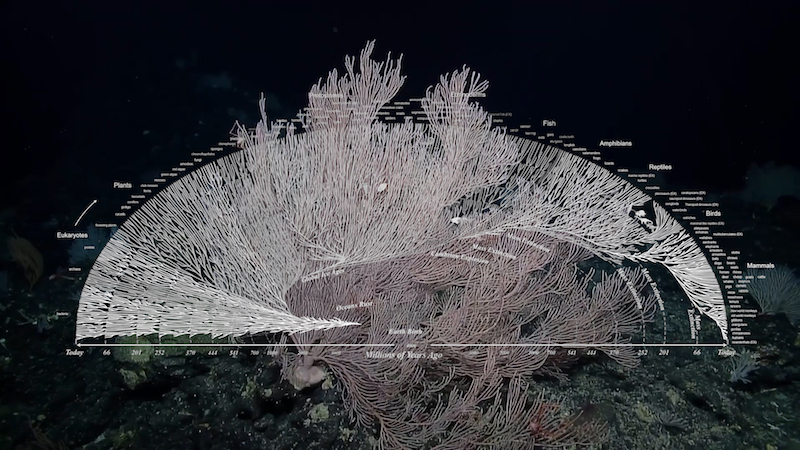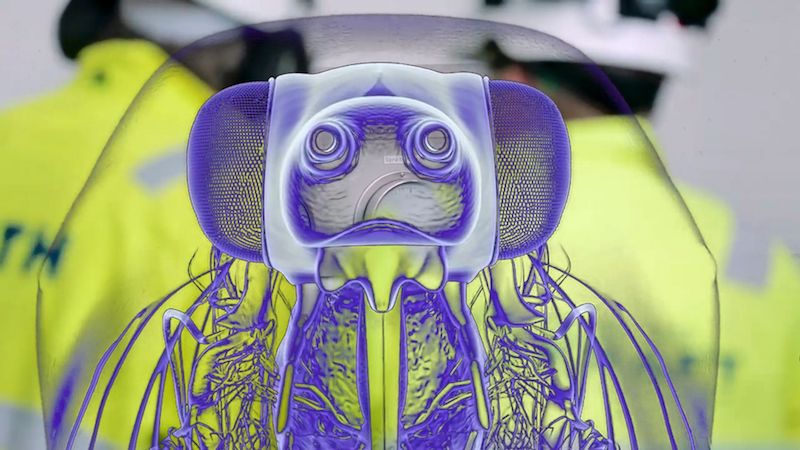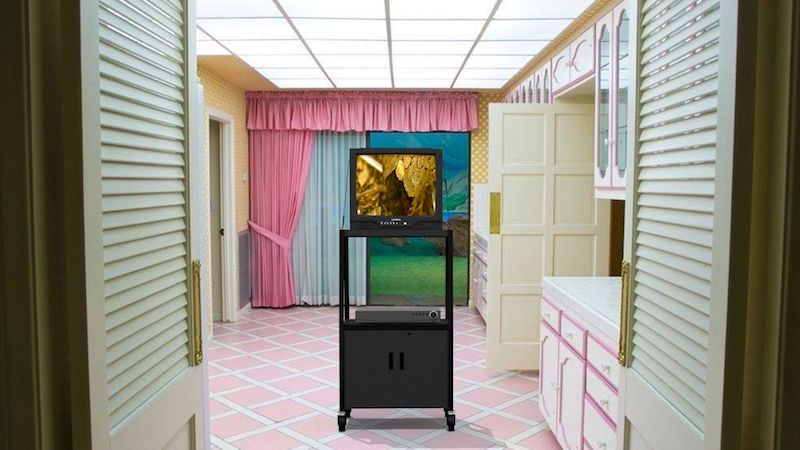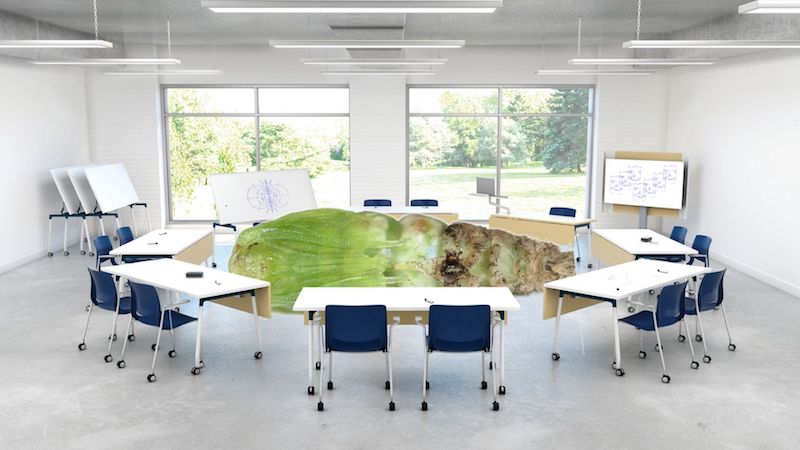Article by Juan José Santos Mateo // Sept. 18, 2020
DIS commissioned a “vaccine” that has been tested on humans since June of this year. They requested it from a very particular laboratory, and what they have elaborated—although it has an undeniable scientific aspect to it—is closer to a utopian and critical concept. It is utopian in that it proposes a solution based on the idea of eco-queerness as an alternative, and it’s critical in that it does not hesitate to point out the causes of the economic, social and biological crises in our world. This laboratory, a collective of artists grouped under the name Institute of Queer Ecology, produced ‘Metamorphosis,’ an online video with four episodes narrated by Mykki Blanco and Danny Orlowski. The piece establishes a parallel between the process of a caterpillar’s total transformation into a moth or butterfly and the possibilities that a similar operation within our human boundaries could open up. Their essays are spoken over digital animation and found footage and, in the midst of our present economic, health and social crisis, consider a future detached from the mistakes of today. Queer ecological resistance must insist on a “non-normalizing relationship to the past,” as the writer and academic Naomi Booth has stated. Will the “vaccine” be successful? We spoke to the Institute of Queer Ecology about ‘Metamorphosis’ and how it seeks to envision new forms of kinship.

Institute for Queer Ecology: ‘Prologue: Serotiny’, video still // Courtesy of IQECO
Juan José Santos Mateo: In the context of how the term is used in ‘Metamorphosis,’ how would you define queerness?
Institute of Queer Ecology: For us, queerness is a visioning tool and a strategy to build the world we intensely desire, deep within every cell of this collaborative organism. IQECO conceptualizes queerness in line with many thinkers before us: bell hooks notes “‘Queer’ not as being about who you’re having sex with (that can be a dimension of it), but ‘queer’ as being about the self that is at odds with everything around it and that has to invent and create and find a place to speak and to thrive and to live.” José Esteban Muñoz, who we directly quote in ‘Metamorphosis,’ wrote: “Queerness is essentially about the rejection of a here and now and an insistence on potentiality for another world.” For IQECO, queerness is a way of inhabiting the world together while embodying change, hope, joy, pain and reverence. It is at once an occasion for building intentional (often multispecies) community and a celebration of that community.
JJSM: In this work, you do not ignore the commercial and elitist use of the queer concept. How would you explain or would you share the ideas expressed in ‘Metamorphosis’ to a person unfamiliar with the concepts you’re referencing, or someone who does not have access to the advertising of the first world?
IQECO: One of the beautiful things about many topics discussed in critical theory is that you kind of feel them in your bones long before encountering them in an academic context. If your coming-of-age experience at all brushed up against some form of queer experience, we hope that you feel at home with the themes and concepts of our work, even if the words and phrases are new.

Institute of Queer Ecology: ‘Episode 1: Grub Economics’, video still // Courtesy of IQECO
JJSM: In an article published in Burnaway magazine, Rahel Aima affirms that the metaphors that you used “never actually harden, calcify [or] come into focus,” constituting it as a call “for more imagination, more dreaming.” How would you respond to this criticism?
IQECO: With gratitude. We understand in Aima’s critique that her frustration is rooted in the film’s call to move “beyond the pragmatism of current environmental politics.” Our intention with this project was not to provide a step-by-step guide to reducing your carbon footprint or to weigh the pros and cons of new developments in geo-engineering. Naomi Klein, Oliver Morton, William T. Vollmann, Elizabeth Kolbert, the UN and countless others have written far more and far better on these topics than we ever could. We believe that one of the essential roles art plays in times of crisis is to encourage and validate hope. ‘Metamorphosis’ grew out of troubled soil. We saw in ourselves and our communities a feeling of helplessness that small-scale pragmatic advice—and even global events like the Paris Agreement—did little to dispel. This project began with imagination, dreaming and a refusal to feel helpless, and yes, we hope that ‘Metamorphosis’ inspires more of that refusal, more imagination, more dreaming, if nothing else.

Institute of Queer Ecology: ‘Episode 2: Liquidation in the Pupal Stage’, video still // Courtesy of IQECO
JJSM: If capitalism introduces eternal desire—one that is never satisfied—as its primary tool for world building, then which type of desire is queerness’s primary tool?
IQECO: We can distinguish between capitalist desire and the desire of queerness through a framework of shallow and deep desires. Although these desires may never be fully satisfied, we ask ourselves: What does capitalism want us to want? What does queerness? The promises of capitalism are shallow desires, the desire for money, power, recognition. The pursuit of shallow desire only results in individual success. Although queer folks can also desire these things, the core of queer desire is a deeper demand for collective empowerment. Capitalism’s desire always promises satisfaction at the expense of so many others, while the desire of queerness generates a world that thrives because we thrive together, a world where sharing is encouraged, because we all need less when we have more. This is not to say that LGBTQ+ folks can’t get stuck in the shallows, but, because the success of capitalist desire is predicated on the extraction and disempowerment of our (multispecies) kin, the deep desire inherent in queerness can never be satisfied through the same kinds of success promised by capitalism.

Institute of Queer Ecology: ‘Episode 2: Liquidation in the Pupal Stage’, video still // Courtesy of IQECO
JJSM: Taking into account that this work was made public in the middle of a global pandemic, it carries the message that moments of crisis are also opportunities to think about a better world. How can queerness contribute to improving our lifestyles during this global pandemic, a crisis that overlaps with the climate crisis?
IQECO: ‘Metamorphosis’ was largely made in 2018–19, before the pandemic, but was released at a moment mid-virus when we were seeing an unprecedented international response to crisis. The global response to COVID-19 is clear evidence of governments’ capabilities to fund immediate and sweeping actions to mitigate disaster, when the crisis is viewed as an urgent threat to public health and economic interests.

Institute of Queer Ecology: ‘Episode 3: Emergence’, video still // Courtesy of IQECO
While COVID-19 presents a clear threat to both these spheres, the climate crisis occurs more slowly, making it more complex to communicate and exponentially more catastrophic. In a world where the media has evolved into a tool that can only address the crisis of the moment, artists often find themselves better equipped to translate longer-term issues into formats that can illuminate them. We won’t be able to address the climate crisis through individualism, nationalism or capitalism. In ‘Metamorphosis’ we propose an alternative framework of cooperation through queerness—across borders and species—with a praxis rooted in symbiosis and mutualism rather than built on competition and extraction. Moments of crisis aren’t opportunities to think about a better world; they are opportunities to put the thinking we’ve done in fairer weather into action, to make radical changes, to push for the world we need.
This article is part of our monthly topic of ‘Kinship.’ To read more from this topic, click here.



















